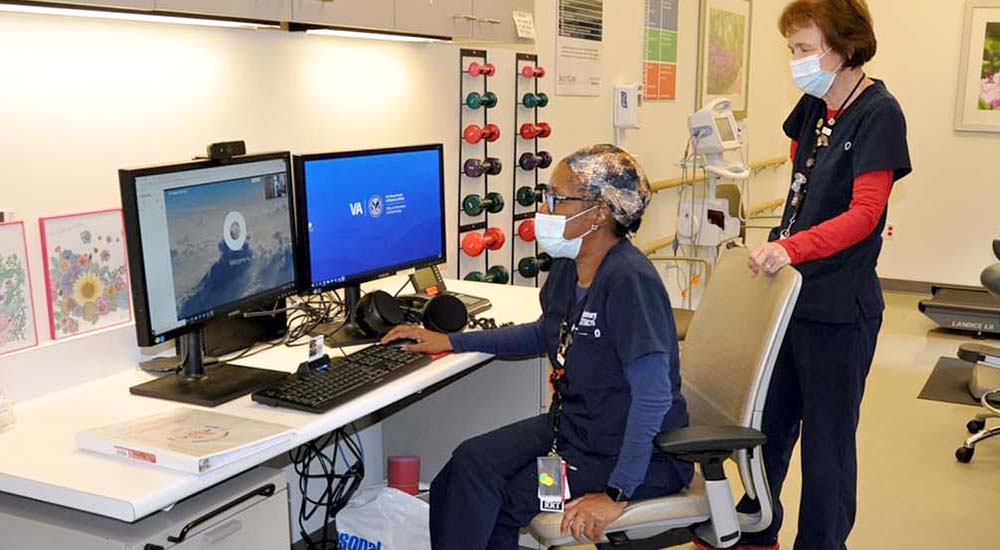If a Veteran is receiving care for chronic obstructive pulmonary disease in the Southeast Louisiana Veterans Health Care System, their physician might order a consult with pulmonary rehabilitation coordinators Mary Labiche and Zina White.
Before the pandemic, this would have meant face-to-face sessions in the pulmonary rehabilitation gym. Veterans can now attend from home.
Pictured above, Labiche and White help a patient remotely log on to the Video Virtual Connect platform in the pulmonary rehabilitation gym at the New Orleans VA facility.
Pulmonary rehabilitation helps patients who are suffering with persistent symptoms, like breathlessness or loss of stamina, improve their quality of life.
Respiratory therapists guide patients through stretches and exercises to increase muscle strength and lung capacity. Patients also receive education about exercise pacing and their disease to effectively care for themselves once the program has ended.
Educators, trainers, cheerleaders
As rehabilitation leaders, Labiche and White must be educators, trainers and cheerleaders rolled into one. They provide an essential service to sufferers of chronic lung disease.
When the coronavirus pandemic limited face-to-face services one year ago, Labiche and White pioneered virtual pulmonary rehabilitation. It is hosted on VA Video Connect, a live video platform that connects Veterans to their caregivers on any computer, tablet or mobile device with an internet connection.
Army Veteran Harvey Malone was among the first participants to graduate from the virtual version of pulmonary rehabilitation. He speaks highly of Labiche and White’s skill at engaging participants over VA Video Connect.
“Their communication was outstanding,” Malone said. “It made me want to participate. It made me want to improve myself to get better.”
“I look forward to Tuesday mornings”
Before the pandemic, Malone attended pulmonary rehabilitation in person at the New Orleans Veterans Medical Center. He then transitioned to rehabilitation online. In Malone’s eyes, the move online was positive.
“We established a bond,” Malone said, reflecting on his interactions with the other participants. “We were a very close-knit team. I looked forward to Tuesday and Thursday mornings during the program.”
The VA video connect platform enabled him to build camaraderie with his program peers.
“At first, the choice to go online was a matter of getting Veterans the help they need during the pandemic,” White said.
Now Labiche and White intend to continue a virtual rehabilitation option after in-person meetings resume.
“The virtual program can reach people that can’t travel to attend rehabilitation in person,” said Labiche. “We realized that virtual pulmonary rehabilitation is just as effective as when it is done in person. Having it as an option will help us improve quality of life for more Veterans.”
Rya Butterfield, Ph.D., is a public affairs specialist with the Southeast Louisiana Veterans Health Care System.
Topics in this story
More Stories
The Medical Foster Home program offers Veterans an alternative to nursing homes.
Watch the Under Secretary for Health and a panel of experts discuss VA Health Connect tele-emergency care.
The 2024 National Veteran Suicide Prevention Annual Report provides the foundation for VA’s suicide prevention programs and initiatives.






